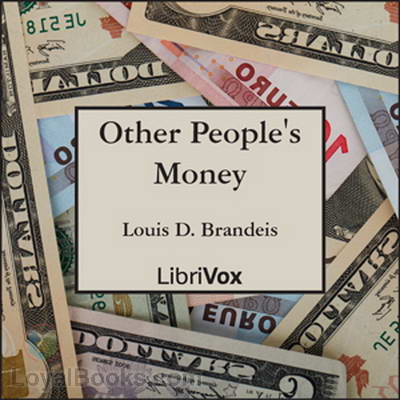
By: Louis D. Brandeis (1856-1941)
"Other People's Money" by Louis D. Brandeis is a timeless classic that delves into the controversial topic of corporate greed and its effects on society. Brandeis, a renowned lawyer and activist, provides insightful commentary on the power dynamics at play in the world of big business and finance.
Through a series of case studies and analyses, Brandeis exposes the ruthless tactics employed by powerful financiers to maximize profits at the expense of the average citizen. He highlights the dangers of allowing a select few to control vast amounts of wealth and influence, warning of the potential for economic inequality and social unrest.
Brandeis' writing is both informative and thought-provoking, challenging readers to question their assumptions about capitalism and the role of government in regulating financial markets. His arguments are supported by a wealth of evidence and research, making a compelling case for the need for greater transparency and accountability in the business world.
Overall, "Other People's Money" is a must-read for anyone interested in understanding the complex relationship between money, power, and ethics. Brandeis' keen insights and bold advocacy for social justice continue to resonate today, making this book as relevant now as it was when it was first published. Book Description:
Other People's Money and How the Bankers Use It is a collection of essays written by Louis Brandeis published as a book in 1914. The book attacked the use of investment funds to promote the consolidation of various industries under the control of a small number of corporations, which Brandeis alleged were working in concert to prevent competition. Brandeis harshly criticized investment bankers who controlled large amounts of money deposited in their banks by middle-class people. The heads of these banks, Brandeis pointed out, routinely sat on the boards of railroad companies and large industrial manufacturers of various products, and routinely directed the resources of their banks to promote the interests of their own companies. These companies, in turn, sought to maintain control of their industries by crushing small businesses and stamping out innovators who developed better products to compete against them. Brandeis supported his contentions with a discussion of the actual dollar amounts -- in millions of dollars -- controlled by specific banks, industries, and industrialists such as J. P. Morgan, noting that these interests had recently acquired a far larger proportion of American wealth than corporate entities had ever had before. He extensively cited testimony from a Congressional investigation performed by the Pujo Committee, named after Louisiana Representative Arsène Pujo, into self-serving and monopolistic business dealing. The book received great publicity at the time, and was widely lauded by legal academics. Attention to the book was amplified by Brandeis' nomination to the Supreme Court of the United States in 1916.
|
